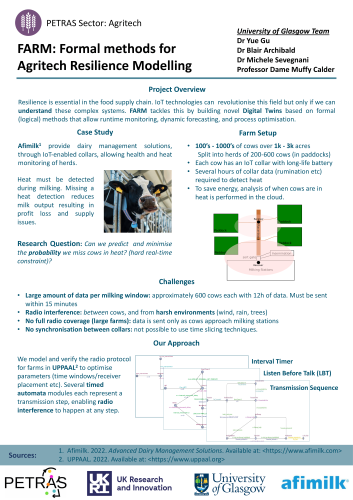Formal methods for Agritech Resilience Modelling (FARM)
This project addresses challenges in the adoption of Agritech by defining a new Digital Twin framework based on models enabling multiscale runtime analysis, dynamic forecasting, and process optimisation.
Agritech is the use of inexpensive network-enabled sensors and actuators in agriculture and farming to improve yield, increase produce quality, and optimise efficiency. This technology promises to revolutionise food production and contribute to global food security and environmental sustainability. Despite recent progress, several unsolved challenges are still slowing a wider adoption of Agritech: end-users experience difficulties in designing, programming, and deploying these complex systems; deployed systems are hard to manage and typically do not support autonomous adaptation for resilience against failures or cyber-attacks; market fragmentation does not allow interoperability between solutions from different vendors; autonomy and the consequences of its deployment are poorly understood.
Resilience-by-design will be achieved by tightly coupling our hierarchy of models with appropriate Machine Learning routines for the dynamic handling of unknown events, such as unusual weather patterns, hardware failures, and malicious attacks. The project is developing an approach and is evaluating its adequacy by working on two use cases provided by our industrial partners: an automated IoT-based turmeric farm (Quanta Computer) and a smart collar system for cow monitoring (Afimilk). In the first use case, we will develop techniques to guarantee the resilience of an automated pest control system against cyberattacks and other adverse environmental events. In the second use case, the focus will be on multiscale Digital Twin analysis to identify and share common threat patterns across various Afimilk deployments.
The FARM poster displayed at the PETRAS Academic Conference | Networking Research Showcase on 16 June 2022:


